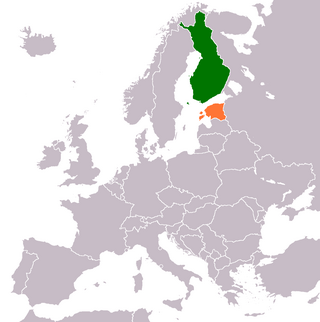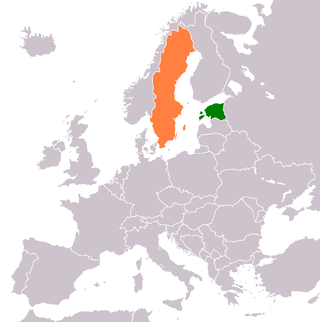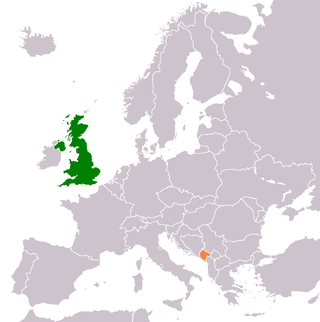 | |
Estonia | United Kingdom |
|---|---|
Estonia and the United Kingdom are full members of the Council of Europe and NATO.
 | |
Estonia | United Kingdom |
|---|---|
Estonia and the United Kingdom are full members of the Council of Europe and NATO.


The relationship between the UK and Estonia has its beginning during the Estonian War of Independence, when the UK sent a Royal Navy detachment led by Admiral E.A. Sinclair to defend Estonia's shores. The British seamen who gave their lives defending Estonia's freedom during the conflict were laid to rest in the Tallinn Military Cemetery. [1]
Before the Soviet occupation in 1940, relations between the UK and Estonia were close. The UK was a major market for Estonian produce, more than 30% of Estonia's exports went to the UK. The United Kingdom never recognised Estonia's annexation in 1940. [1]
The UK recognised the restoration of Estonian Independence on 27 August 1991. Diplomatic relations between the two countries were re-established on 5 September 1991, and the British Embassy opened in Tallinn in the same year. Estonia's relations with the UK are close. Britain provided both political and practical support to Estonia's efforts to join the EU and NATO. [2]
Both Estonia and the United Kingdom provided contributions to the NATO mission in Afghanistan.
In October 2016 it was announced that 800 British troops would be stationed at Tapa Army Base in Estonia. [3]

The British Council has a representation in Tallinn. There is an active programme of English language teaching support, cultural exchange and scholarships for Estonian students to study in the UK. [2]
An estimated 10,000-15,000 Estonian citizens live in the UK, about 3,000-5,000 of them in London. [1] The most active communities are in London, Bradford and Leicester. There is a total of 13 Estonian societies in the UK, the oldest being the London Estonian Society established in 1921. [1]
Tallinn and Estonia's reputation as a tourist destination has grown in Great Britain over the past few years. Estonia's accession to the EU in 2004 gave a significant boost to reciprocal travel – that year 30% and the following year (2005) 60% more (62.3 thousand) British tourists were accommodated in Estonia than in previous years. In 2012 nearly 55 thousand British tourists used Estonian accommodation establishments. Tallinn has also become one of the most popular destinations among Baltic cruise ports. In 2012 over 75 000 British cruise tourists visited Estonia. [1]
Reports of British tourists excessively drinking in Tallinn have received media coverage in the UK. [4]
The UK is in 9th place among Estonia's trade partners, making up 3% of Estonia's total trade turnover. UK-Estonian trade was worth 790 million euros in 2012. As a foreign investor, the UK's interest in Estonia has been fairly great – it is the source of 2% of all foreign direct investments made in Estonia. [1]

Lauri Bambus was appointed Estonian ambassador to the United Kingdom in August 2014. [1] Christopher Holtby was appointed British ambassador to Estonia in January 2012. [5]
Estonia has an embassy in London and three honorary consulates (in Cheltenham, Paisley and Wales). [6] The United Kingdom has an embassy in Tallinn. [7]
Queen Elizabeth II of the United Kingdom paid a state visit to Estonia in October 2006. [8] Prince Harry also made an official visit in May 2014 and paid tribute to Estonia's war dead. [9]
Leaders regularly meet as part of the Northern Future Forum.
The Republic of Estonia gained its independence from the Russian Empire on 24 February 1918 and established diplomatic relations with many countries via membership of the League of Nations. The forcible incorporation of Estonia into the Soviet Union in 1940 was not generally recognised by the international community and the Estonian diplomatic service continued to operate in some countries. Following the restoration of independence from the Soviet Union, Russia was one of the first nations to re-recognize Estonia's independence. Estonia's immediate priority after regaining its independence was the withdrawal of Russian forces from Estonian territory. In August 1994, this was completed. However, relations with Moscow have remained strained primarily because Russia decided not to ratify the border treaty it had signed with Estonia in 1999.

The diplomatic foreign relations of the United Kingdom are conducted by the Foreign, Commonwealth and Development Office, headed by the Foreign Secretary. The prime minister and numerous other agencies play a role in setting policy, and many institutions and businesses have a voice and a role.

The bilateral relations between the Italian Republic and the United Kingdom of Great Britain and Northern Ireland are warm and exceptionally strong. This relationship is also known as Anglo–Italian relations.

Denmark–United States relations are the bilateral relations between Denmark and the United States of America. Both countries are members of the Arctic Council, OECD, OSCE, NATO and the United Nations.

The relations between Estonia and the United States have been constant and strong since Estonia regained its independence in 1991. The United States and Estonia are allies and partners.

Relations between Ukraine and the United Kingdom have existed in one form or another since Ukrainian independence in 1991. The two countries have ties across political, military, social and economic spheres. The UK hosts up to 100,000 Ukrainian refugees giving it the 8th largest Ukrainian migrant population in Europe.

Foreign relations exist between Australia and Estonia. Australia first recognised Estonia on 22 September 1921. Australia was among the first countries to re-recognise Estonia's independence on 27 August 1991. Both countries re-established diplomatic relations on 21 November 1991.

Lithuania – United Kingdom relations are foreign relations between the United Kingdom and Lithuania.

Estonia–Finland relations are foreign relations between Finland and Estonia. The independent Republic of Finland, established in 1917, and the independent Republic of Estonia, established in 1918, established diplomatic relations and formally recognised each other in 1920. Diplomatic relations between the two countries were interrupted during World War II and officially restored on 29 August 1991. Finland has an embassy in Tallinn and an honorary consulate in Tartu. Estonia has an embassy in Helsinki and five honorary consulates, located in Oulu, Turku, Ekenäs, Tampere and Kotka. Both countries are full members of the Council of the Baltic Sea States, Council of Europe, European Union, NATO and the Eurozone. Finland has given full support to Estonia's membership of the European Union. Estonia also has strongly supported Finland's NATO membership. The majority languages in both countries are Finnic languages, as Finland's main language, Finnish, is related to Estonian, and there is and has been a certain feeling of kinship. 76% of Finns have visited Estonia, and in 2004, 1.8 million Finns reported visiting Estonia. The excise tax on alcohol is lower in Estonia than in Finland, thus it is common to buy large volumes of alcohol when returning from Estonia: a study in 2014 indicated that 34% of alcohol sold in Estonia is bought by Finns. Finnish and Swedish investors are the largest foreign investors in Estonia. Both Finland and Estonia are members of the European Union, Schengen agreement and the Eurozone, freeing international travel and trade between the countries. Finland is Estonia's top import partner, accounting for over 15% total import value in 2012, as well as the second-greatest market for Estonia's exports after Sweden. Finland's government recognised Estonia's independence in 1920. In response to the Soviet invasion, diplomatic missions were de facto removed. However, when Estonia restored its independence, this "temporary obstruction" was resolved. During the restoration of Estonia's independence, Finland secretly contributed with significant economic aid and know-how under the cover of "cultural co-operation" in order to not upset the Soviet Union. Finland continues to contribute militarily, such as officers' training, and the provision of equipment.

Strong foreign relations exist between the Republic of Azerbaijan and the United Kingdom. The Embassy of United Kingdom in Baku opened in 1992. The Embassy of the Republic of Azerbaijan in London opened in 1994. Both countries are members of the Council of Europe, the Organization for Security and Co-operation in Europe.

Estonia–India relations refers to the bilateral diplomatic relations between Estonia and India. India first recognised Estonia on 22 September 1921 when the former had just acquired membership in the League of Nations. India re-recognised Estonia on 9 September 1991 and diplomatic relations were established on 2 December of the same year in Helsinki. Estonia is represented in India by its embassy in New Delhi and its honorary consulate in Mumbai. India is represented in Estonia through its embassy in Helsinki (Finland) and through an honorary consulate in Tallinn.

Estonia–Sweden relations are foreign relations between Estonia and Sweden.

Croatia–United Kingdom relations, or British-Croatian relations, are foreign relations between Croatia and the United Kingdom. After Croatia declared independence from Yugoslavia in June 1991, the UK established diplomatic relations with Croatia on 25 June 1992. Both countries are members of the Council of Europe and NATO. the United Kingdom gave full support to Croatia's applications for membership in the European Union and NATO.

Formal diplomatic relations between Georgia and the United Kingdom can be traced back to at least 1919, during the First Georgian Republic. After the defeat of German Empire, Georgia's ally, in WWI, parts of Georgia came under British administration and British troops were also stationed in Tiflis to stave off the Bolshevik invasion. This lasted until 1920, when Britain left due to a variety of geopolitical factors.

Estonia-Sri Lanka relations are foreign relations between Estonia and Sri Lanka. Estonia has an embassy Colombo. Sri Lanka has a non resident embassy in Stockholm. Estonia's 2004 accession to the European Union had a positive effect on bilateral relations with Sri Lanka, since the EU is one of Sri Lanka's biggest donors and trade partners.

Montenegro–United Kingdom relations are the bilateral relations between Montenegro and the United Kingdom. Both nations are members of the Council of Europe and NATO and had fought on the same side in both World War I and World War II.

Eerik-Niiles Kross is an Estonian politician, diplomat, former chief of intelligence and entrepreneur. He is a member of parliament (Riigikogu). During the 1980s, Kross was a prominent figure in the anti-Soviet non-violent resistance movement in Soviet Estonia. After re-independence, in 1991, he joined Estonia's Foreign Ministry. He served as the head of intelligence from 1995 to 2000; and as national security advisor to former President Lennart Meri in 2000 and 2001.

Estonia-Turkey relations are foreign relations between Estonia and Turkey. Estonia has an embassy in Ankara and Turkey has an embassy in Tallinn. Both countries are full members of Council of Europe and of NATO. Estonia is also an EU member and Turkey is an EU candidate.

North Macedonia–United Kingdom relations are the bilateral and diplomatic relations between the Republic of North Macedonia and the United Kingdom of Great Britain and Northern Ireland. Both countries are members of the Council of Europe and NATO.